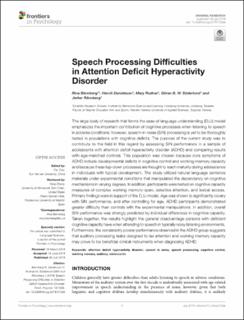| dc.contributor.author | Blomberg, Rina | |
| dc.contributor.author | Danielsson, Henrik | |
| dc.contributor.author | Rudner, Mary | |
| dc.contributor.author | Söderlund, Göran | |
| dc.contributor.author | Rönnberg, Jerker | |
| dc.date.accessioned | 2020-03-16T08:30:15Z | |
| dc.date.available | 2020-03-16T08:30:15Z | |
| dc.date.created | 2020-01-22T13:53:53Z | |
| dc.date.issued | 2019 | |
| dc.identifier.citation | Blomberg, R., Danielsson, H., Rudner, M., Söderlund, G. B. W. & Rönnberg, J. (2019). Speech processing difficulties in attention deficit hyperactivity disorder. Frontiers in Psychology, 10. | en_US |
| dc.identifier.issn | 1664-1078 | |
| dc.identifier.uri | https://hdl.handle.net/11250/2646861 | |
| dc.description.abstract | The large body of research that forms the ease of language understanding (ELU) model emphasizes the important contribution of cognitive processes when listening to speech in adverse conditions; however, speech-in-noise (SIN) processing is yet to be thoroughly tested in populations with cognitive deficits. The purpose of the current study was to contribute to the field in this regard by assessing SIN performance in a sample of adolescents with attention deficit hyperactivity disorder (ADHD) and comparing results with age-matched controls. This population was chosen because core symptoms of ADHD include developmental deficits in cognitive control and working memory capacity and because these top-down processes are thought to reach maturity during adolescence in individuals with typical development. The study utilized natural language sentence materials under experimental conditions that manipulated the dependency on cognitive mechanisms in varying degrees. In addition, participants were tested on cognitive capacity measures of complex working memory-span, selective attention, and lexical access. Primary findings were in support of the ELU-model. Age was shown to significantly covary with SIN performance, and after controlling for age, ADHD participants demonstrated greater difficulty than controls with the experimental manipulations. In addition, overall SIN performance was strongly predicted by individual differences in cognitive capacity. Taken together, the results highlight the general disadvantage persons with deficient cognitive capacity have when attending to speech in typically noisy listening environments. Furthermore, the consistently poorer performance observed in the ADHD group suggests that auditory processing tasks designed to tax attention and working memory capacity may prove to be beneficial clinical instruments when diagnosing ADHD. | en_US |
| dc.language.iso | eng | en_US |
| dc.publisher | Frontiers Media S.A. | en_US |
| dc.rights | Navngivelse 4.0 Internasjonal | * |
| dc.rights.uri | http://creativecommons.org/licenses/by/4.0/deed.no | * |
| dc.subject | attention deficit hyperactivity disorder | en_US |
| dc.subject | speech in noise | en_US |
| dc.subject | speech processing | en_US |
| dc.subject | cognitive control | en_US |
| dc.subject | working memory | en_US |
| dc.subject | auditory | en_US |
| dc.title | Speech processing difficulties in attention deficit hyperactivity disorder | en_US |
| dc.type | Peer reviewed | en_US |
| dc.type | Journal article | en_US |
| dc.description.version | publishedVersion | en_US |
| dc.rights.holder | Copyright © 2019 Blomberg, Danielsson, Rudner, Söderlund and Rönnberg. | en_US |
| dc.source.volume | 10 | en_US |
| dc.source.journal | Frontiers in Psychology | en_US |
| dc.identifier.doi | 10.3389/fpsyg.2019.01536 | |
| dc.identifier.cristin | 1780111 | |
| cristin.ispublished | true | |
| cristin.fulltext | original | |
| cristin.qualitycode | 2 | |

